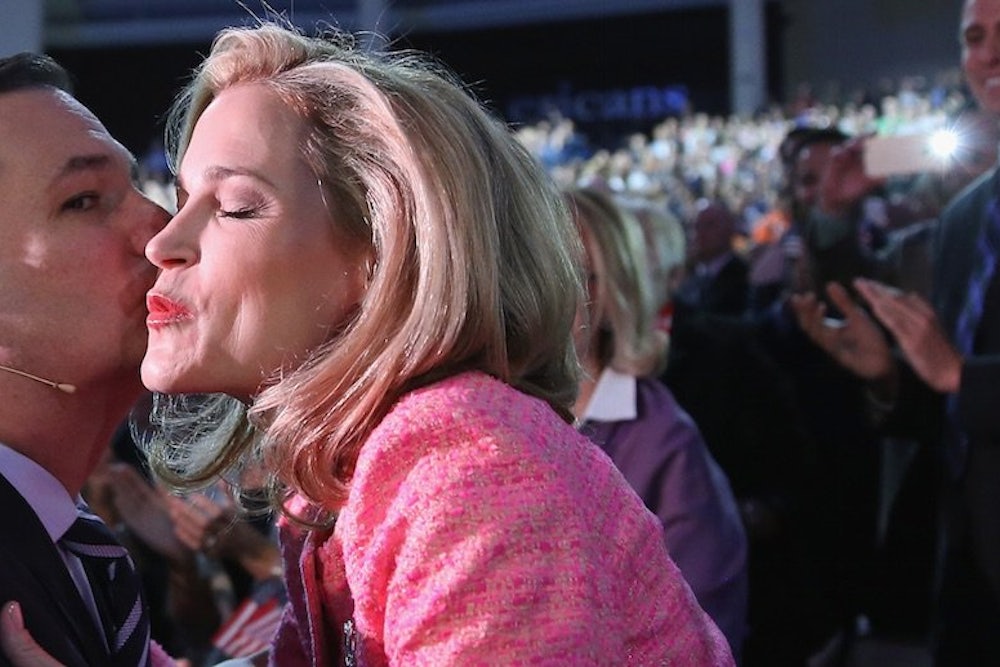As a meting out of cosmic justice, it’s satisfying to learn that Ted Cruz and his family will be signing up for Obamacare. The Texas senator escaped the yoke of Obamacare last year because Goldman Sachs, where his wife works, provided his family with an exorbitant, untaxed health plan. Now that she’s taking unpaid leave to help him campaign for the presidency, the Goldman plan is at least temporarily suspended, and that leaves the Cruzes two main choices: go uninsured, or sign up through his employer, the federal government.
But thanks to Republican Senator Chuck Grassley, the Affordable Care Act prohibits members of Congress from obtaining insurance through the Federal Employees Health Benefit (FEHB) program, the way most federal employees do. Instead, their benefits run through Obamacare.
"We'll be getting new health insurance and we'll presumably do it through my job with the Senate, and so we'll be on the federal exchange with millions of others on the federal exchange," Cruz told CNN.
Whether Cruz will shop on a federally facilitated exchange, as he suggested, or on D.C.’s health insurance exchange is a surprisingly important question, to which I'll return. But in either case, the Cruz brood will be depending on Obamacare, and on its fifth anniversary no less. Haha, karma and so forth, yes. But some of his critics are treating his decision not to leave his family exposed to extreme medical duress and financial hardship as evidence of "opportunism and hypocrisy."
This is rich: @tedcruz calls #Obamacare lawless but signs up for it. http://www.politico.com/story/2015/03/ted-cruz-enroll-obamacare-116363.html?hp=l1_3 ...
—
ron_fournier
There is no obvious hypocrisy here. Obamacare is Cruz's one real option if he wants his family covered, and self-deprivation has never been part of his identity. But there is a lesson in the way Cruz glides seamlessly between two different insurance systems, both of which guarantee coverage to all takers, and it exposes the huge empathy gap in his worldview.
If there were hypocrisy here, most of Cruz's critics wouldn't know where to look for it. The narrower question of which exchange Cruz shops on is important because it’ll determine whether he can obtain the same government contribution to his health plan that’s available to other federal employees. Cruz has been a vocal opponent of the rule that lets members of Congress carry their FEHB contribution onto the D.C. exchange. He’s called it illegal, and supported legislation to abolish it. He would require members and most of their staffers to pay full freight for their premiums, and thus encourage further brain drain on Capitol Hill. Accepting the contribution would constitute a dramatic reversal.
But that benefit—analagous to the contribution most employers make to worker premiums—runs through the D.C. health insurance exchange, which is not federally facilitated. If the Cruzes buy their insurance in Texas, on a federally facilitated exchange, they will pay the full premium for it. If they buy in D.C., they will be eligible for a subsidy.
Between his insistence that he’ll shop on the federal exchange and his pitched remarks about the carryover rule—"I strongly oppose the exemption that President Obama illegally put in place for members of Congress because Harry Reid and the Senate Democrats didn't want to be under the same rules as the American people”—it sounds as if Cruz will be foregoing the contribution. The hypocrisy charge only sticks if he accepts it. But rather than address the question directly, Cruz resorted to vagueness. "I believe we should follow the text of the law," he said. Well, the text of the law is unclear, and the law as implemented makes the subsidy available. I can’t imagine Cruz would sneak around his entire political identity to accept the contribution. It would amount to a Shakespearean betrayal of his supporters. But he hasn’t been categorical, either.
We thus can’t quite infer whether Cruz will pay his entire premium or just a fraction of it. But we can infer something more important. In Cruz’s mind, a family health insurance plan is both indispensable and taken for granted, like four walls and a roof, or dialing 911 in an emergency. He’s built a presidential candidacy around the stipulation that Obamacare is a huge disaster and a threat to liberty, and yet enrolling in Obamacare ranks higher on his list of ordinal preferences than going uninsured. As it should.
But Cruz, more than any other presidential hopeful, is identified with the view that Obamacare should be repealed, and its beneficiaries left with nothing. Unlike any of his presumptive opponents, he’s turned his anti-Obamacare nostrums into bill text. It would repeal Obamacare and replace insurance coverage for 16 million people with the opportunity to buy much worse insurance at full cost across state lines. Cruz introduced the legislation in anticipation of a June Supreme Court ruling, which could throw insurance markets in three dozen states (including Texas) into chaos. If, in the midst of that chaos, his bill were to become law, the uninsurance rate would soar, but Cruz himself would end up better off than he is right now.
Under any circumstance Cruz can imagine—including the grim circumstance he hopes to impose on the country—his family maintains guaranteed coverage and protection against pre-existing condition discrimination. If he loses the primary, or the presidency, his wife goes back to Goldman. If he becomes president, his health care becomes a taxpayer responsibility outright. If he succeeds in repealing the Affordable Care Act as a senator, then the provision prohibiting members of Congress from obtaining federal health benefits will go with it, and he'll become eligible for the generous FEHB program once again. Heads he wins, tails everyone else loses.
Nobody should begrudge Cruz for hedging his bets against the dangers of uninsurance like this, even if he's only doing it subconsciously. But he affords almost no one else the same compassion.
